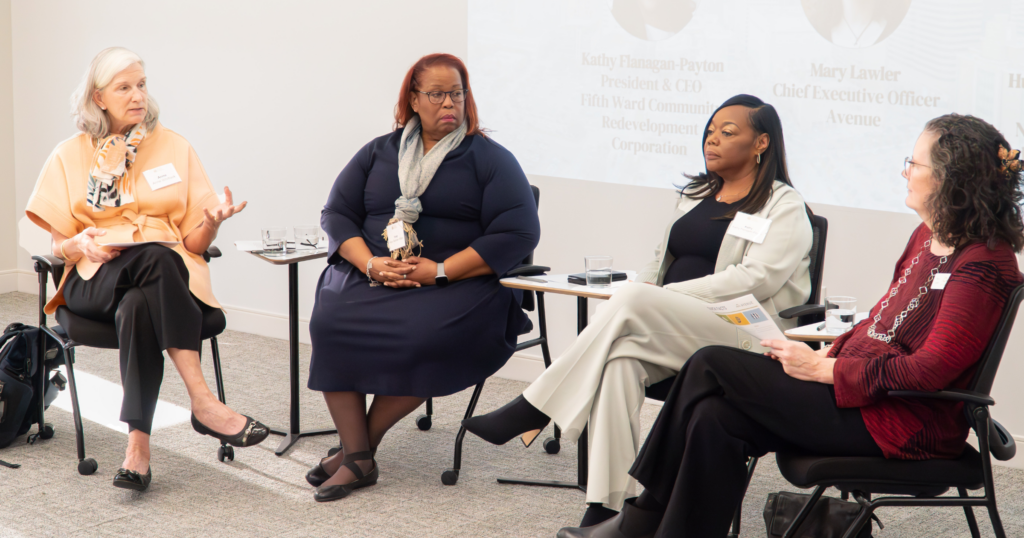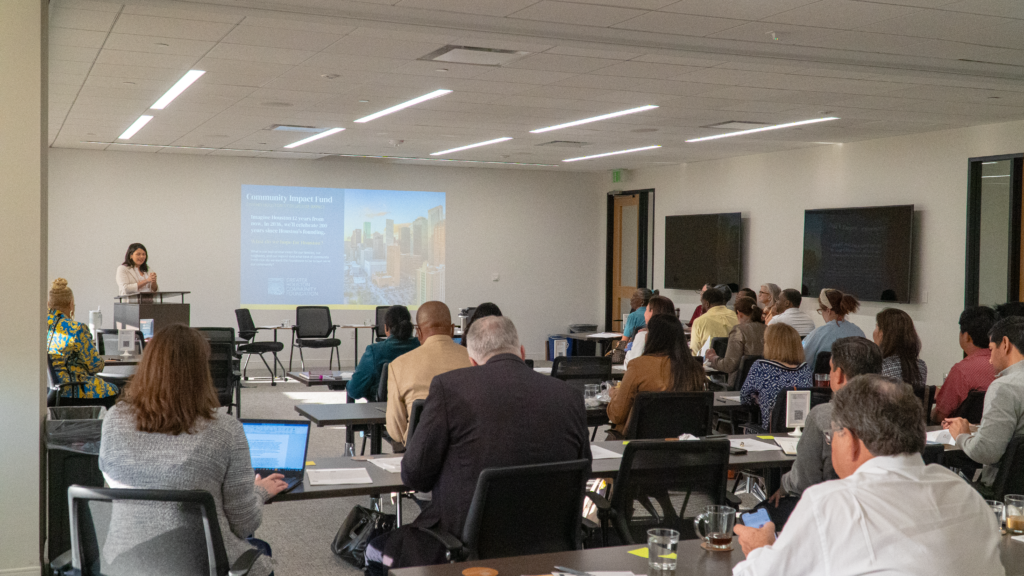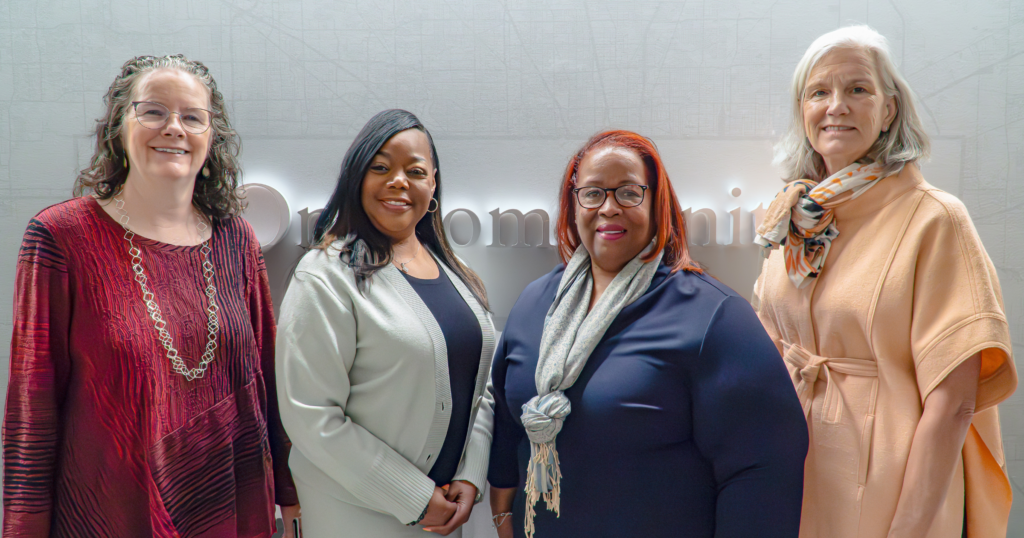Advancing Impact Donor Breakfast: Building Thriving Neighborhoods

On Tuesday, March 19, 2024, Greater Houston Community Foundation (Foundation) hosted over 45 guests to gain new insights into issues related to place-based initiatives. The panel discussion was moderated by Anne Whitlock, Founding Director of My Connect Community. Panelists included Kathy Flanagan-Payton, Huey German-Wilson, Mary Lawler, and Anne Whitlock, who work with organizations implementing unique place-based strategies in different communities around Houston.
Diana Zarzuelo, Vice President of Community Impact at the Foundation, gave an overview of the Foundation’s newly established Community Impact Fund. Zarzuelo shared that Houston is one of the wealthiest cities in the world, yet one in four Harris County children live in poverty, and national research has found that one in three children who grow up in poverty are likely to remain in poverty as an adult. When a significant portion of our residents are stuck in a cycle of poverty, it significantly hurts Houston’s economic growth. Zarzuelo presented research from Understanding Houston that shows where a low-income child grows up has an enormous impact on a the child’s chances of breaking the cycle of intergenerational poverty to safeguard their future.

Then Carol R. Naughton, Chief Executive Officer of Purpose Built Communities, provided key insights on the importance of place from a national perspective. Purpose Built Communities offers leadership and consultation to help local leaders design neighborhood revitalization efforts nationwide. Naughton reiterated how engaging residents of a specific community/neighborhood can lead to transformative change and how people in underserved communities are not broken; the systems are broken. Additionally, Naughton emphasized that place matters, neighborhoods matter, and building infrastructure worthy of those who reside in those communities is critical to advancing economic mobility. Naughton has found that change only happens at the speed of trust, and she stressed the importance of how this place-conscious work must align with what the community members want for their neighborhood.
Key Themes in Building Thriving Neighborhoods
After hearing insights from Naughton, attendees were introduced to our moderator and panelists. The panelists highlighted key place-based strategies that support positive change for people in historically marginalized neighborhoods:
- Understanding the community you are working in and hearing resident needs and desires is critical. A place-based approach requires different strategies and priorities — ranging from illegal garbage dumping to health access, workforce development, and affordable housing — for each community. Invest in resources and opportunities the residents need to enhance and significantly accelerate their quality of life.
- Place-based investments for physical structures are great, but when paired with support and programming for the residents, they are catalytic. It is essential to give people access to knowledge, tools, and resources they need to lead their community to achieve the vision it has created.
- Implementing small, early-action projects can help engage the neighborhood as more significant investments take longer. Show residents a ‘small win’ so they see their contributions pay off. These efforts can include the addition of neighborhood murals or community gardens. These “small wins” can also precipitate larger investments, like sidewalk renovations.
- Each neighborhood will have various metrics for measuring success. Ways to measure progress range from dollars invested, surveying residents to see if there are positive changes in perceptions, measuring health outcomes, or more.
- Sustained investments are needed to help implement long-term planning and programming for each community. Each community requires a multifaceted approach to build thriving neighborhoods and witnessing real change can take years or decades, but it is impossible without sustained investments.
Takeaways From the Panelists
A special thank you to all of our panelists. Your knowledge and experiences with several existing initiatives that aim to reshape neighborhoods and expand opportunities for all were incredibly insightful. Learn more about our speakers and how they help to ignite positive change in their communities:
Kathy Flanagan-Payton, President and CEO, Fifth Ward Community Redevelopment Corporation
Born and raised in Houston’s Fifth Ward, Flanagan-Payton represents the possibilities for her neighborhood while remaining responsive to today’s community and its current needs. Fifth Ward Community Redevelopment Corporation fosters holistic community development by strengthening vulnerable Fifth Ward residents’ spiritual, physical, social, and financial health. Flanagan-Payton shared that they must be responsive to legacy residents, balancing the physical redevelopment of the community with the simultaneous investment in human development.
Huey German-Wilson, Founder, Northeast Houston Redevelopment Center
The Northeast Houston Redevelopment Center advocates for resources that directly benefit the Northeast part of Houston, focusing on food insecurity, health equity, economic redevelopment, education, environmental justice, and building resilience HUBs. They work closely with residents to ensure the community gets what it wants and needs. From Farmer’s Markets, to Community Gardens, to the development of a Mobile Pantry, Northeast Houston Redevelopment Center partners with community organizations to make Northeast Houston more resilient.
Mary Lawler, Chief Executive Officer, Avenue
Avenue serves the Greater Northside neighborhood – a predominantly Latino neighborhood. Lawler shared how focusing on resident engagement, through figuring out residents’ interests and dreams, helps connect the community to partners and resources to help drive change in their community. Lawler believes that if you can connect people socially, they will eventually connect civically and possibly politically. Civic involvement is critical because when people come together, they can accomplish more collectively than individually. Political involvement benefits positive change because people work with elected officials and governmental institutions to make changes that resonate in the community.
Anne Whitlock, Founding Director, Connect Community
Connect Community works in Houston’s Gulfton and Sharpstown areas with a large refugee population. As a neighborhood organization, they see themselves as the “community quarterback,” working closely with the most vulnerable residents to bring about lasting change in the area. Who are the most vulnerable residents? They are residents with limited English, little education, and often no sense of how the systems work. The community works to break down the barriers that vulnerable Gulfton and Sharpstown residents face to help them achieve lasting access. They do this through relationship building, hearing the needs of its residents, and building enduring infrastructure to help the community thrive, not survive.
Stay informed about how the Foundation addresses essential community needs through transformative impact by signing up for the Community Impact Funds’ quarterly Insider Update newsletter.
This website is a public resource of general information that is intended, but not promised or guaranteed, to be correct, complete and up to date. The materials on this website, including all comments and responses to comments, do not constitute legal, tax, or other professional advice, and is not intended to create, and receipt or viewing does not constitute, nor should be a considered an invitation for, an attorney-client relationship. The reader should not rely on information provided herein and should always seek the advice of competent legal counsel and/or a tax professional in the reader’s state or jurisdiction. The owner of this website does not intend links on the website to be referrals or endorsements of the linked entities.
